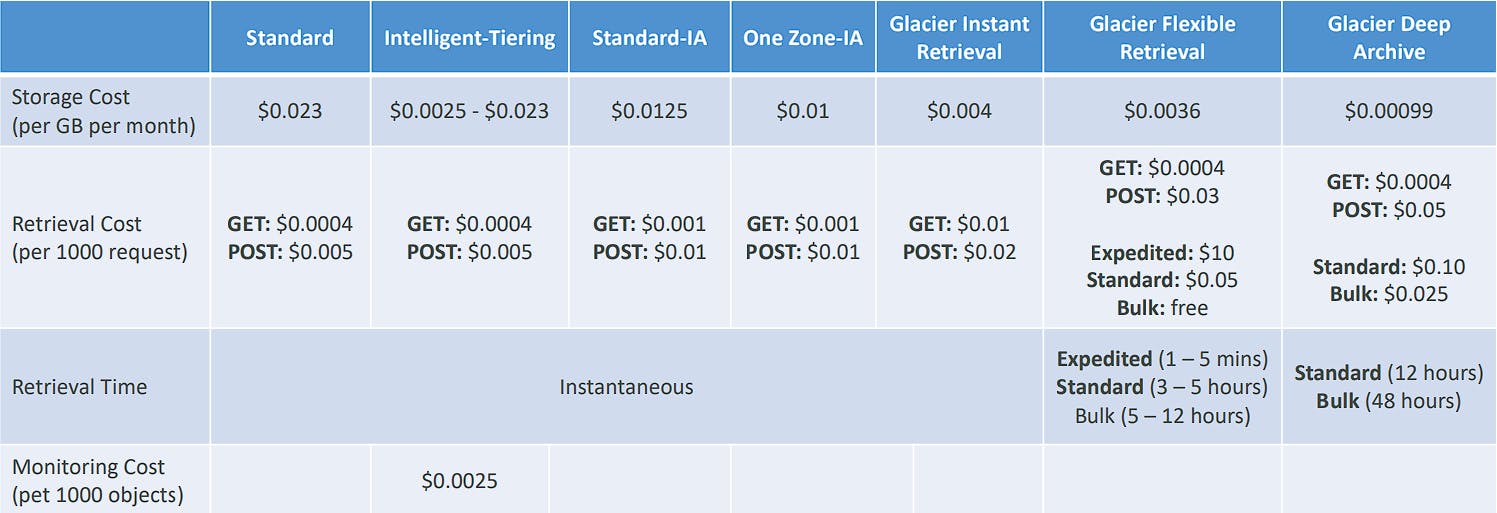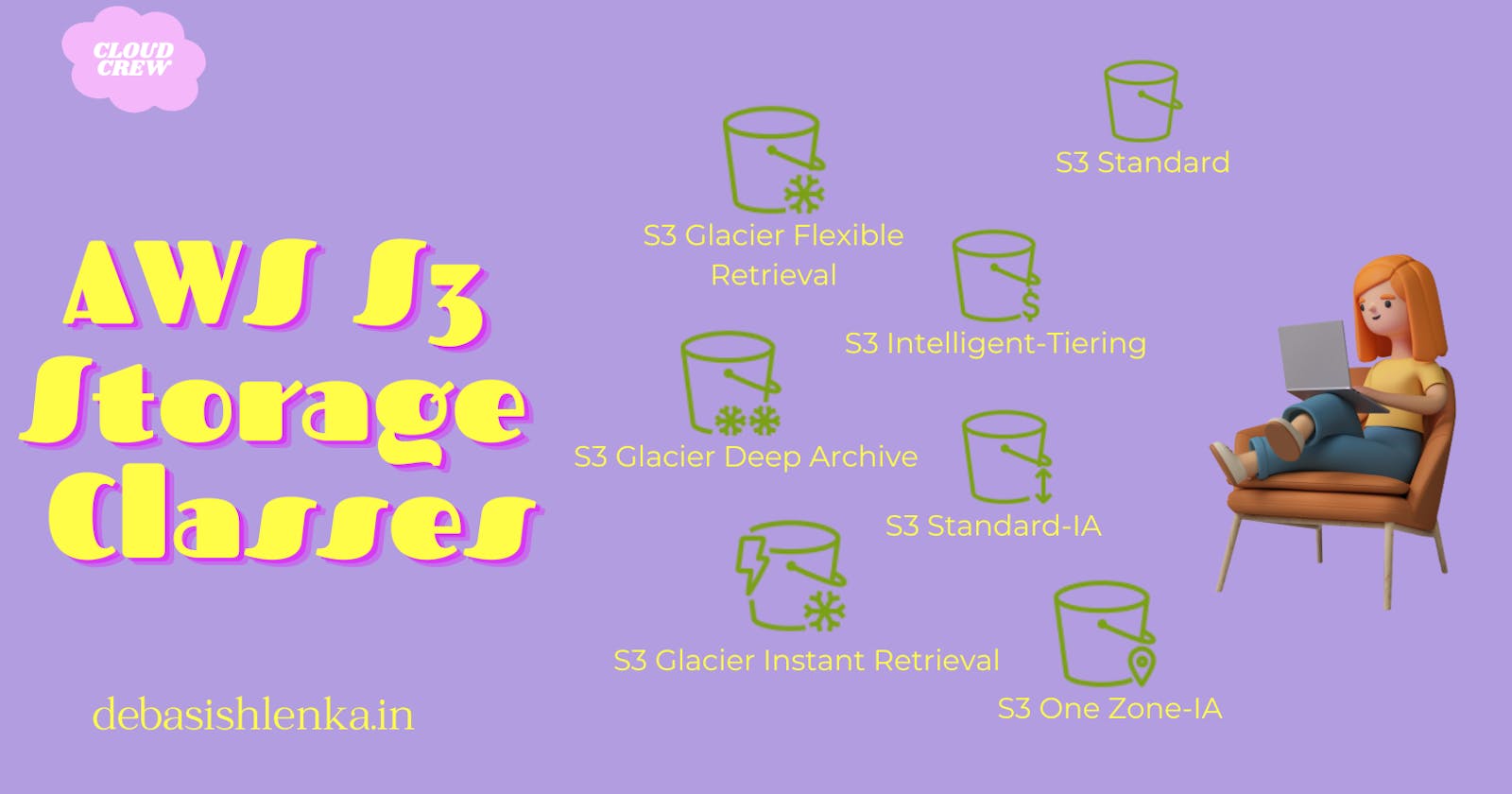AWS S3 Storage Classes Explained: Importance and Various Options ⛅🚀
Different types of S3 Storages available for different use cases.
Table of contents
What is Amazon S3:
Amazon Simple Storage Service (S3) is an AWS storage service that is used to store data in the form of objects. It is used to store and protect any amount of data for a range of use cases, such as data lakes, websites, cloud-native applications, backups, archives, machine learning, and analytics. It’s advertised as ”infinitely scaling” storage. The data which is uploaded by the user in S3, that data is stored as objects and provided an ID. Moreover, they store in shapes like buckets and can upload a maximum file size of 5 terabytes (TB). This service is basically designed for the online backup and archiving of data and applications on Amazon Web Services (AWS). It is designed for 99.999999999% (11 9's) of durability, and stores data for millions of customers all around the world.
Amazon S3 Storage Classes :
Amazon S3 Standard
Amazon S3 Intelligent-Tiering
Amazon S3 Standard-Infrequent Access
Amazon S3 One Zone-Infrequent Access
Amazon S3 Glacier Instant Retrieval
Amazon S3 Glacier Flexible Retrieval
Amazon S3 Glacier Deep Archive
Amazon S3 on Outposts
Amazon S3 Standard :
It is used for general purposes and offers high durability, availability, and performance object storage for frequently accessed data.
It has a 99.99% Availability criteria.
S3 Standard is appropriate for a wide variety of use cases, including cloud applications, dynamic websites, content distribution, mobile and gaming applications, and big data analytics.
Low latency and high throughput.
Sustain 2 concurrent facility failures.
Amazon S3 Intelligent-Tiering :
S3 Intelligent Tiering storage class is designed to optimize storage costs by automatically moving data to the most cost-effective storage access tier, without performance impact or operational overhead.
For a small monthly monitoring and automation fee per object, S3 monitors access patterns of the objects and moves objects that have not been accessed for 30 consecutive days to the infrequent access tier.
There are no separate retrieval fees when using the Intelligent Tiering storage class. If an object in the infrequent access tier is accessed, it is automatically moved back to the frequent access tier.
No additional fees apply when objects are moved between access tiers
Ideal to optimize storage costs automatically for long-lived data when access patterns are unknown or unpredictable.
Amazon S3 Standard-Infrequent Access :
For data that is less frequently accessed, but requires rapid access when needed
Lower cost than S3 Standard
Data stored redundantly across multiple geographically separated AZs and are resilient to the loss of an Availability Zone.
offers greater availability and resiliency than the ONEZONE_IA class.
Objects are available for real-time access.
Ideal for use for the primary or only copy of data that can’t be recreated.
Amazon S3 One Zone-Infrequent Access :
Different from other S3 Storage Classes which store data in a minimum of three Availability Zones, S3 One Zone-IA stores data in a single Availability Zone and costs 20% less than S3 Standard-IA. It’s a very good choice for storing secondary backup copies of on-premises data or easily re-creatable data. S3 One Zone-IA provides you the same high durability, high throughput, and low latency as in S3 Standard.
Stores the object data in only one AZ, which makes it less expensive than Standard-Infrequent Access
Data is not resilient to the physical loss of the AZ resulting from disasters, such as earthquakes and floods.
One Zone-Infrequent Access storage class is as durable as Standard-Infrequent Access, but it is less available and less resilient.
Amazon S3 Glacier Instant Retrieval :
Use for archiving data that is rarely accessed and requires milliseconds retrieval.
Minimum storage duration of 90 days
Amazon S3 Glacier Flexible Retrieval :
S3 GLACIER storage class is suitable for low-cost data archiving where data access is infrequent and retrieval time of minutes to hours is acceptable.
Storage class has a minimum storage duration period of 90 days
Provides configurable retrieval times, from minutes to hours
Expedited retrieval: 1-5 mins
Standard retrieval: 3-5 hours
Bulk retrieval: 5-12 hours
AZs destruction can lead to difficulty in accessing data.
when you have to retrieve large data sets , then S3 glacier flexible retrieval is best for backup and disaster recovery use cases.
Amazon S3 Glacier Deep Archive :
Glacier Deep Archive storage class provides the lowest-cost data archiving where data access is infrequent and retrieval time of hours is acceptable.
Has a minimum storage duration period of 180 days and can be accessed at a default retrieval time of 12 hours.
Supports long-term retention and digital preservation for data that may be accessed once or twice a year
Amazon S3 on Outposts :
Amazon S3 on Outposts delivers object storage to your on-premises AWS Outposts environment to meet local data processing and data residency needs. Using the S3 APIs and features, S3 on Outposts makes it easy to store, secure, tag, retrieve, report on, and control access to the data on your Outpost. AWS Outposts is a fully managed service that extends AWS infrastructure, services, and tools to virtually any data center, co-location space, or on-premises facility for a truly consistent hybrid experience.
Priced on S3 storage capacity ordered for your Outpost 48 TB and 96 TB SKUs.
Single storage class at GA – Amazon S3 Outposts .Designed to durably and redundantly stores data across multiple devices and servers on your Outposts.
Stored data is always encrypted using SSE-S3 Same eventual consistency model as other S3 storage classes.
Amazon S3 pricing :


